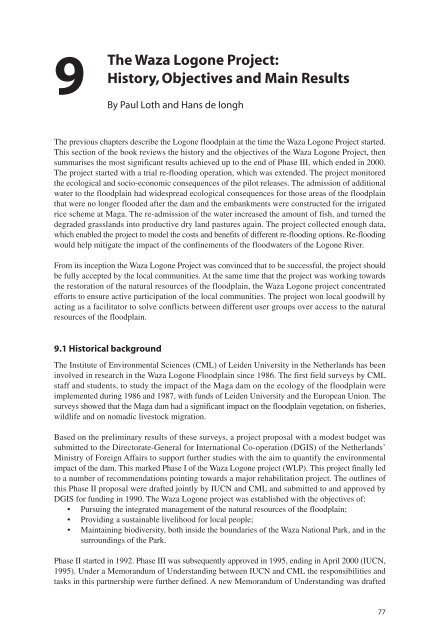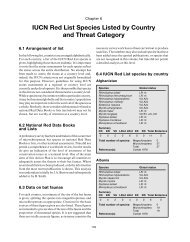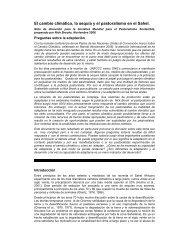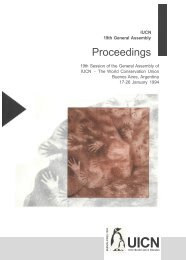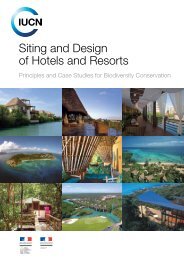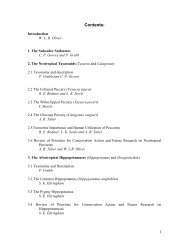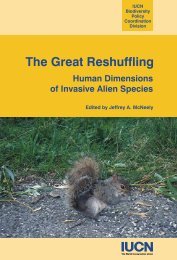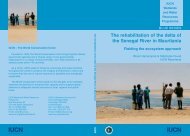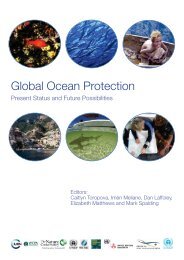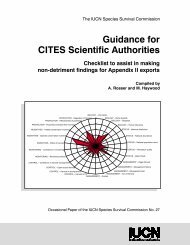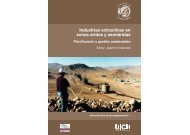The return of the water - IUCN
The return of the water - IUCN
The return of the water - IUCN
Create successful ePaper yourself
Turn your PDF publications into a flip-book with our unique Google optimized e-Paper software.
9<br />
<strong>The</strong> Waza Logone Project:<br />
History, Objectives and Main Results<br />
By Paul Loth and Hans de Iongh<br />
<strong>The</strong> previous chapters describe <strong>the</strong> Logone floodplain at <strong>the</strong> time <strong>the</strong> Waza Logone Project started.<br />
This section <strong>of</strong> <strong>the</strong> book reviews <strong>the</strong> history and <strong>the</strong> objectives <strong>of</strong> <strong>the</strong> Waza Logone Project, <strong>the</strong>n<br />
summarises <strong>the</strong> most significant results achieved up to <strong>the</strong> end <strong>of</strong> Phase III, which ended in 2000.<br />
<strong>The</strong> project started with a trial re-flooding operation, which was extended. <strong>The</strong> project monitored<br />
<strong>the</strong> ecological and socio-economic consequences <strong>of</strong> <strong>the</strong> pilot releases. <strong>The</strong> admission <strong>of</strong> additional<br />
<strong>water</strong> to <strong>the</strong> floodplain had widespread ecological consequences for those areas <strong>of</strong> <strong>the</strong> floodplain<br />
that were no longer flooded after <strong>the</strong> dam and <strong>the</strong> embankments were constructed for <strong>the</strong> irrigated<br />
rice scheme at Maga. <strong>The</strong> re-admission <strong>of</strong> <strong>the</strong> <strong>water</strong> increased <strong>the</strong> amount <strong>of</strong> fish, and turned <strong>the</strong><br />
degraded grasslands into productive dry land pastures again. <strong>The</strong> project collected enough data,<br />
which enabled <strong>the</strong> project to model <strong>the</strong> costs and benefits <strong>of</strong> different re-flooding options. Re-flooding<br />
would help mitigate <strong>the</strong> impact <strong>of</strong> <strong>the</strong> confinements <strong>of</strong> <strong>the</strong> flood<strong>water</strong>s <strong>of</strong> <strong>the</strong> Logone River.<br />
From its inception <strong>the</strong> Waza Logone Project was convinced that to be successful, <strong>the</strong> project should<br />
be fully accepted by <strong>the</strong> local communities. At <strong>the</strong> same time that <strong>the</strong> project was working towards<br />
<strong>the</strong> restoration <strong>of</strong> <strong>the</strong> natural resources <strong>of</strong> <strong>the</strong> floodplain, <strong>the</strong> Waza Logone project concentrated<br />
efforts to ensure active participation <strong>of</strong> <strong>the</strong> local communities. <strong>The</strong> project won local goodwill by<br />
acting as a facilitator to solve conflicts between different user groups over access to <strong>the</strong> natural<br />
resources <strong>of</strong> <strong>the</strong> floodplain.<br />
9.1 Historical background<br />
<strong>The</strong> Institute <strong>of</strong> Environmental Sciences (CML) <strong>of</strong> Leiden University in <strong>the</strong> Ne<strong>the</strong>rlands has been<br />
involved in research in <strong>the</strong> Waza Logone Floodplain since 1986. <strong>The</strong> first field surveys by CML<br />
staff and students, to study <strong>the</strong> impact <strong>of</strong> <strong>the</strong> Maga dam on <strong>the</strong> ecology <strong>of</strong> <strong>the</strong> floodplain were<br />
implemented during 1986 and 1987, with funds <strong>of</strong> Leiden University and <strong>the</strong> European Union. <strong>The</strong><br />
surveys showed that <strong>the</strong> Maga dam had a significant impact on <strong>the</strong> floodplain vegetation, on fisheries,<br />
wildlife and on nomadic livestock migration.<br />
Based on <strong>the</strong> preliminary results <strong>of</strong> <strong>the</strong>se surveys, a project proposal with a modest budget was<br />
submitted to <strong>the</strong> Directorate-General for International Co-operation (DGIS) <strong>of</strong> <strong>the</strong> Ne<strong>the</strong>rlands’<br />
Ministry <strong>of</strong> Foreign Affairs to support fur<strong>the</strong>r studies with <strong>the</strong> aim to quantify <strong>the</strong> environmental<br />
impact <strong>of</strong> <strong>the</strong> dam. This marked Phase I <strong>of</strong> <strong>the</strong> Waza Logone project (WLP). This project finally led<br />
to a number <strong>of</strong> recommendations pointing towards a major rehabilitation project. <strong>The</strong> outlines <strong>of</strong><br />
this Phase II proposal were drafted jointly by <strong>IUCN</strong> and CML and submitted to and approved by<br />
DGIS for funding in 1990. <strong>The</strong> Waza Logone project was established with <strong>the</strong> objectives <strong>of</strong>:<br />
• Pursuing <strong>the</strong> integrated management <strong>of</strong> <strong>the</strong> natural resources <strong>of</strong> <strong>the</strong> floodplain;<br />
• Providing a sustainable livelihood for local people;<br />
• Maintaining biodiversity, both inside <strong>the</strong> boundaries <strong>of</strong> <strong>the</strong> Waza National Park, and in <strong>the</strong><br />
surroundings <strong>of</strong> <strong>the</strong> Park.<br />
Phase II started in 1992. Phase III was subsequently approved in 1995, ending in April 2000 (<strong>IUCN</strong>,<br />
1995). Under a Memorandum <strong>of</strong> Understanding between <strong>IUCN</strong> and CML <strong>the</strong> responsibilities and<br />
tasks in this partnership were fur<strong>the</strong>r defined. A new Memorandum <strong>of</strong> Understanding was drafted<br />
77


